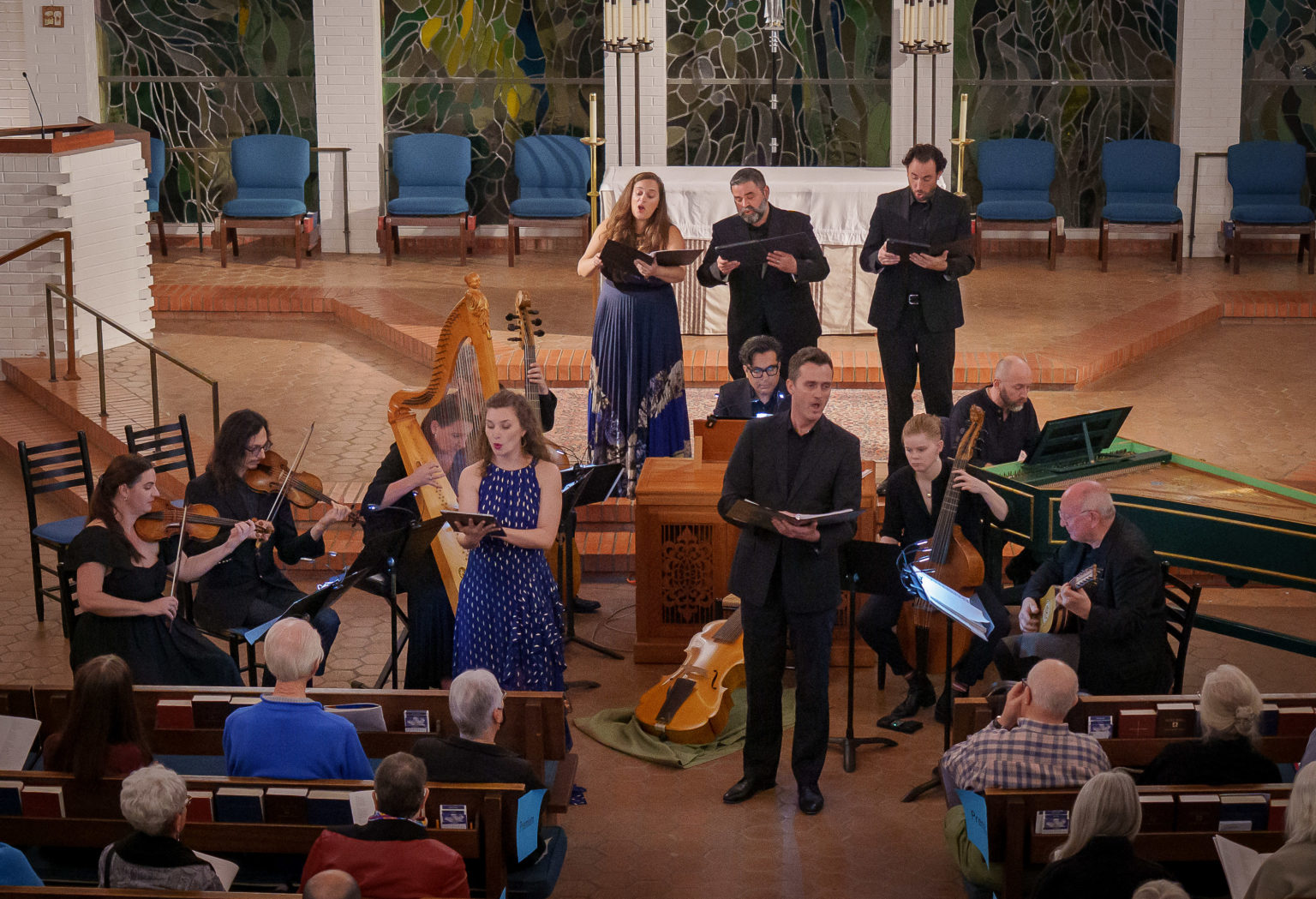Bach Collegium San Diego Celebrates the Music of Monteverdi in ‘Love and Revolution, the Invention of Modern Music’
Western music has often undergone significant stylistic changes at the turn of a new century. In the opening years of the 19th century, Beethoven’s bold, dramatic approach revolutionized the symphony, and in the first decade of the 20th century, Arnold Schoenberg cut his ties with Wagner’s highly chromatic tonality to embrace atonality in his first two string quartets and the orchestral song cycle Das Buch der hängenden Gärten.
In the early decades of the 17th century, Claudio Monteverdi was the leading European composer to break with the elegantly balanced and decidedly Apollonian Renaissance counterpoint perfected by Palestrina to create a new, highly expressive solo vocal style that we call monody. This was the beginning of what we now call the Baroque era, although that popular term was not used in the 17th century. Then it was simply the new music that theorists of the era would define as “the second practice.” This new style ushered in the first opera, Monteverdi’s 1607 Orfeo, as well as his many volumes of secular madrigals, some of which resembled short, nonstaged operas.

Singers l. to r.: Danielle Reutter-Harrah, Teresa Wakim, Jason McStoots, Aaron Sheehan & John Buffet. Ruben Valenzuela is at the chamber organ. [photo (c.) Gary Payne]
Monteverdi’s “Lamento d’Arianna,” the earliest work featured on the Bach Collegium program, is the only surviving portion of the lost score to Arianna (1608), his second opera. We have this enchanting scena for mezzo-soprano and a trio of fishermen because the composer published this music separately in one of his later madrigal collections. Mezzo-soprano Danielle Reuter-Harrah gave an impressive, highly dramatic account of the heroine’s lament, adroitly transitioning from exalted declamation to imploring, languid sighs. Tenors Aaron Sheehan and Jason McStoots as well as baritone John Buffett provided rich harmonic contrast as the consoling fishermen.
Several engaging, animated madrigals from Monteverdi’s 1619 collection opened the concert. Aaron Sheehan, a regular among Valenzuela’s stable of virtuoso tenors, sailed through the daunting fioritura of “Tempo la cetra,” a text that extols the singer’s universal calling to inspire both love and war. The gleam of his upper range always quickens the listener’s pulse. Sheehan, McStoots, and Buffett made a well-balanced trio as they relished he bawdy humor of “Eccomi pronta ai baci”—a lover complains that his mate’s kisses are really bites that leave embarrassing scars.
Early in his career, Handel made an opera based on Giovanni Battista Guarini’s 1590 play Il pastor fido, but the 17th-century madrigalists had already set the play or portions of it to music in the new style. Sigismondo D’India’s 1624 “Se tu, Silvio Crudel” takes the secondary plot of Guarini’s play, the unhappy end of the lovers Silvio and Dorinda, and dramatizes it in five extended madrigals, which the Bach Collegium’s five singers and ample instrumental continuo delivered with daunting emotional conviction and radiant vocal colors. Teresa Wakim’s ringing, supple soprano plumbed the depths of Dorinda’s physical and emotional wounds, and the vocal ensemble ardently propelled the dramatic commentary. At times the quick, chordal iterations of D’India’s choral writing suggested Anglican chant on steroids. In Monteverdi’s solo madrigal “Ohimè ch’o cado,” Wakim communicated the poetry’s extreme passions with exuberant, soaring exclamations that revealed the prowess of her upper range.
Two sonatas by Dario Castello allowed the instrumentalists to exalt their artistry while the vocalists rested. The brilliant flourishes and sweet sonority of violinists Tekla Cunningham and Aaron Westman made the Sonata Decima particularly rewarding.
This concert was presented by the Bach Collegium San Diego at All Souls’ Episcopal Church in Point Loma on Friday, March 8, 2024.

Ken Herman, a classically trained pianist and organist, has covered music for the San Diego Union, the Los Angeles Times’ San Diego Edition, and for sandiego.com. He has won numerous awards, including first place for Live Performance and Opera Reviews in the 2017, the 2018, and the 2019 Excellence in Journalism Awards competition held by the San Diego Press Club. A Chicago native, he came to San Diego to pursue a graduate degree and stayed.Read more…
